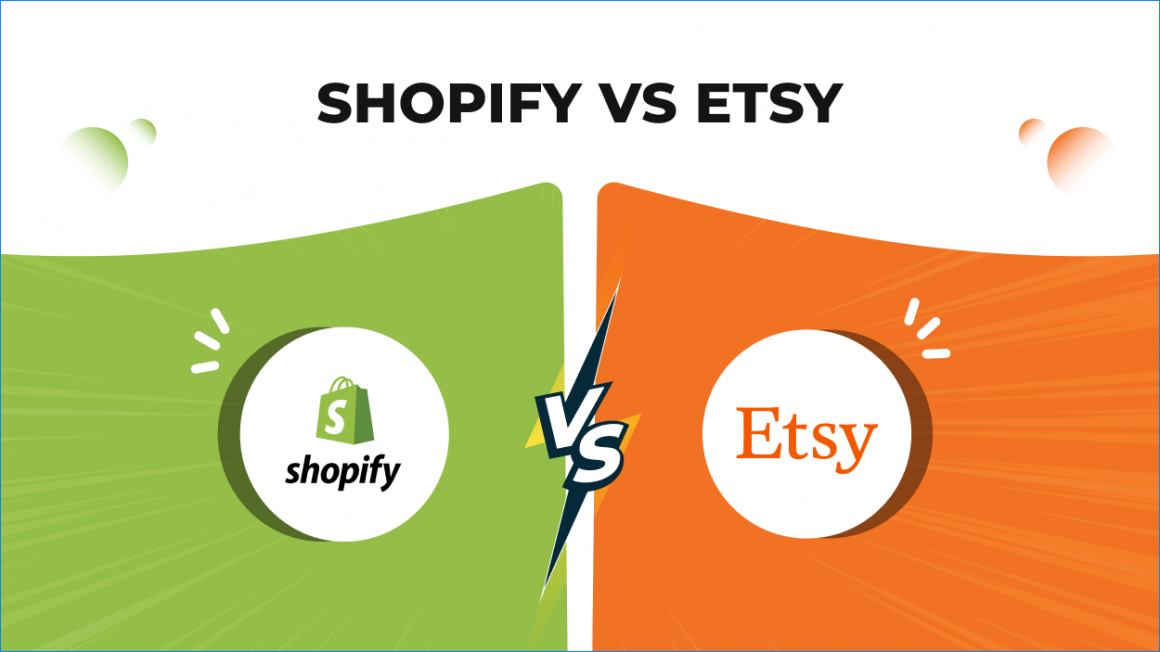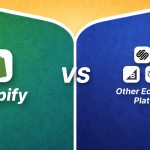Contents
If you are a business owner then which platform will you choose for your business? Obviously you choose the best option that gives you a significant impact on your business success.
However, when we talk about the world of e-commerce you must have heard of Shopify and Etsy, right? These two options are the best and offer different types of features to different sellers and business models.
If you are confused about which platform you should use for your business then you should read the following article till the end. We will be a comparison between Shopify and Etsy Marketplace based on multiple parameters like features, pricing, etc.
Hence read the article carefully till the end if you want to make the best decision for your business. So let’s get started.
Overview of Shopify and Etsy
Under this section of the article read about the basic Shopify vs Etsy for Ecommerce with the help of their donation.
What is Shopify?
Shopify is one of the famous and dedicated e-commerce platforms that offers its users features to create their online stores. There are more than 5.4 million businesses that use this platform. Shopify offers tools like managing, and scaling one’s online store.
If you are a business owner who is looking for a platform that can give you complete control over your branding and user experience then this platform is the best for you.
What is Etsy?
Just like Shopify, Etsy is also a well-known established online marketplace that majorly focuses on handmade goods, craft supplies, and vintage items. There are around 91.5 million active buyers all over the world.
Etsy offers their sellers immediate access to a built-in audience. However, it comes with certain restrictions on what can be sold and how products can be presented.
6 Key Comparisons Between Shopify and Etsy
Shopify vs Etsy for Ecommerce? Which one will you choose? The answer relies on the comparison between the features they offer to their users. Hence read the following section carefully.
Ease of Use
- Shopify: Offers a user-friendly interface with drag-and-drop functionality that makes it easy to set up an online store. It provides extensive resources and customer support to help new merchants navigate the platform.
- Etsy: Simple to use for listing products but offers limited customization options. Sellers can quickly set up a shop but must adhere to Etsy’s guidelines regarding product types and presentation.
Customization
- Shopify: Provides a high level of customization with over 70 themes and the option to create unique designs through coding or hiring developers. Users have full control over their store’s branding, layout, and functionality.
- Etsy: Customization is limited to adding a logo and banner; sellers cannot significantly alter the storefront’s appearance. This uniformity can be beneficial for brand recognition but restricts individuality.
Product Types
- Shopify: Shopify Ecommerce platform Allows users to sell virtually any legal product, including physical goods, digital products, subscriptions, and services. This flexibility makes it suitable for a wide range of businesses.
- Etsy: Focuses on handmade items, vintage products (at least 20 years old), craft supplies, and digital downloads. Sellers must ensure their products fit within these categories.
Pricing Structure
- Shopify: Charges a monthly subscription fee ranging from $29 to $299 depending on the plan selected. While there are no listing fees or transaction fees when using Shopify Payments, credit card processing fees apply.
- Etsy: Does not charge a monthly fee but imposes a $0.20 listing fee per item and a 6.5% transaction fee on sales. Etsy Marketplace for sellers with high sales volumes, these fees can accumulate quickly.
Marketing Tools
- Shopify: Offers robust marketing tools including SEO features, email marketing integrations, social media advertising capabilities, and analytics tools that help sellers track performance.
- Etsy: Provides basic marketing tools but relies heavily on its built-in audience for visibility. Sellers must optimize their listings for Etsy’s search algorithm to compete effectively.
Customer Base
- Shopify: Sellers need to build their own customer base through marketing efforts such as SEO, content marketing, and paid advertising.
- Etsy: Provides immediate access to millions of potential customers actively seeking unique items in its marketplace.
Which One TO Choose?
Choosing between Shopify Ecommerce Platform and Etsy Marketplace depends largely on your business model and goals:
Choose Shopify if:
- You want complete control over your brand and store design.
- You plan to sell a wide variety of products beyond handmade or vintage items.
- You are prepared to invest time in building your own customer base through marketing efforts.
Choose Etsy if:
- You specialize in handmade goods or vintage items and want immediate access to a large audience.
- You prefer a simpler setup without ongoing monthly fees.
- You are comfortable working within the constraints of Etsy’s marketplace environment.
Ultimately, both platforms have their strengths and weaknesses. By understanding your specific needs as a seller—whether it’s customization, product type flexibility, or access to an existing customer base—you can make an informed decision that aligns with your business objectives.
Conclusion
If you read the entire article till the end then you must have understood why it is so important to choose the right E-commerce platform for your business. In this article which was all about Shopify vs Etsy for Ecommerce hope you understood the difference between the two of them.
Whether it’s Shopify Ecommerce platform or Etsy both are best but what suits your business and pockets is the deal. Hence make sure you take the decision carefully after measuring all the necessary factors.









